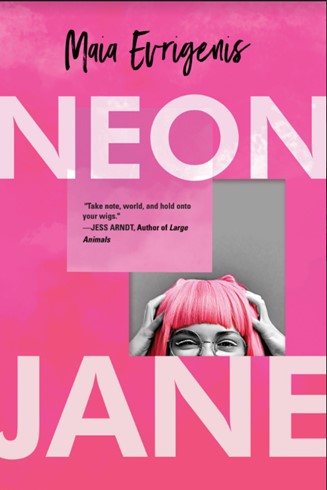FILLING THE GAP between the experience of the sick and those living healthy lives in remission, Neon Jane follows twenty-four-year-old Maia’s journey to move forward from her childhood cancer experience as she is haunted by a spunky, ghostlike, thirteen-year-old cancer patient named Jane.
The two have an inseparable bond and complicated friendship as Maia takes on the role of Jane’s caretaker. Representing Maia as a child, Jane pressures Maia to be a better, more successful person in the name of childhood cancer. Maia argues back through personal reflections about cancer’s ongoing presence in her healthy adult life, and her struggle to move forward from the experience.
As Maia looks for a genetic explanation for her previous cancer, she uncovers the story of her uncle Jason, a famous baroque musician who drowned in his twenties. Through her uncle’s story and new complications with Jane’s health, Maia contemplates what it means to live a full life, and whether it is time to let go of the cancer experience that has defined her for so long.

Maia Evrigenis is a writer from Sacramento, California. Her flash fiction piece “Sanitize” from Neon Jane was selected for the Best Small Fictions 2021 Anthology published by Sonder Press. She was a Stories on Stage winner for the 2020 writing contest in Northern California and is featured in the anthology Twenty Twenty: A Stories on Stage Sacramento Anthology. Her writing has been published in Necessary Fiction, The Black Fork Review, Arkana Literary Journal, The Sacramento News and Review, and The Sacramento Bee. Maia received her MFA in creative writing from Cal Arts and BS in applied psychology from New York University.
- Your new book, Neon Jane, came out last May. What inspired you to write it?
This book was inspired by my experience going through leukemia treatment at thirteen years old. During my cancer treatment, I dreamed of writing a book about the experience of cancer, but as I got older, I realized what I really wanted to talk about was the long-term effect of it and how having a sick past can impact us on a day-to-day basis. I didn’t see a lot of people talking about life after childhood cancer or about cancer in the way that I thought about it. I felt inspired to be a voice.
- All writers approach their stories differently. What’s your process?
Neon Jane is a culmination of thinking and writing about the cancer experience since I was in middle school—though the novel itself was written over eight months and then polished in the years following.
Jane was originally Janey, a character that I created in a short story. In the short story, Janey is sick with cancer and obsessed with punk rock. I really liked that character. She was so angsty. One night, it all just came together, and I stayed up very late writing and bringing Janey into my life a little more. I made her Jane and got rid of the punk rock. A lot of my work comes to life that way, in the sense that I have stories I’m writing now that I had ideas for years ago. Or I had the beginning of a story a year ago, and just now am figuring out the ending. It took me a long time to figure out the ending to Neon Jane, but I ended up having the piece for it all along. It was one of the first pieces I ever wrote using Jane and my own character together, back when I was practicing the idea of combining them for a novel.
- Where and when do you feel most inspired?
I feel most inspired when I have a lot of extra time during the day or on a lazy day. My mind can wander that way, and I get ideas for books, stories, or chapters. If I get stuck with writing, it’s usually because I’ve been racing around or my life’s been too busy. Sometimes I need a good few months away from writing and focusing on sorting out my life to end up feeling inspired again. When I was writing Neon Jane, I spent a lot of time driving up and down California to school and back home to Sacramento. The drive was so boring, one straight line. I figured out so much of the story for Neon Jane on those drives.
- How did you come up with the title of your book?
The book was originally titled The Book of My Blood (not a good title), but there’s a part in the first few chapters where I refer to Jane as Neon Jane. I was workshopping that part of the book in a writing class, and someone started referring to Jane as Neon Jane while he critiqued my work, and soon everyone else in the class was too. It sounded so natural and amazing to my ears, like it was the title all along. I just knew then that it was perfect. I changed the title that day and never looked back. I absolutely love the title.
- What part of the book was the most fun to write?
I’m still not sure if this book was fun to write. People ask me that all the time. My new writing is fun, but this book was something different. This book was just something I had to do. I think God called me to write this and led me on the journey to its publishing. So much of it is so personal. When I flip through it, I still can’t believe I wrote some of the things I did. But I just had to. I had to get it out into the world. I had to share my message. This book means so much to me. I love it so much. The best part has been connecting with people over it. I’ve had people reach out to me and say they feel very seen after reading it. That has been absolutely incredible.
